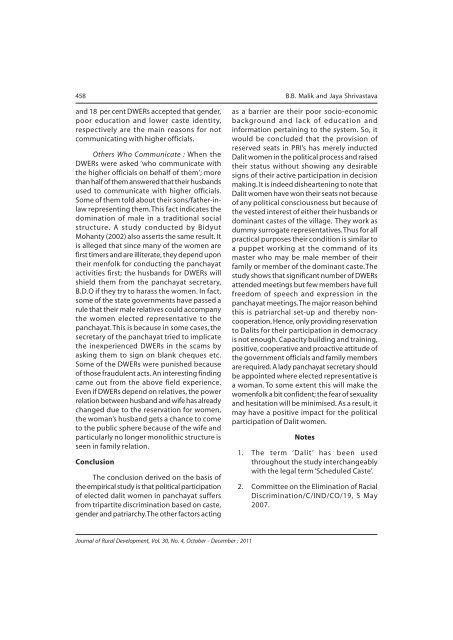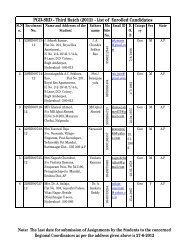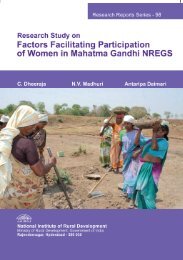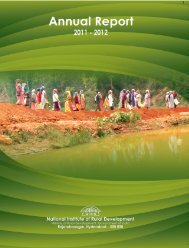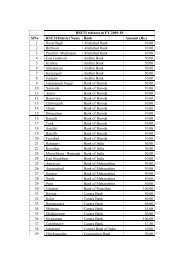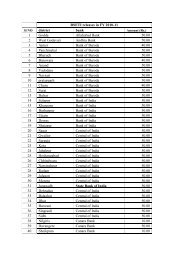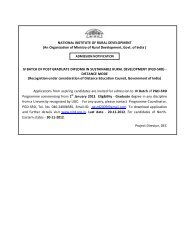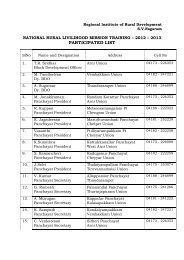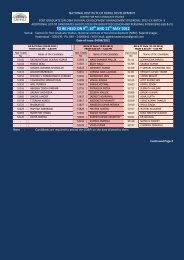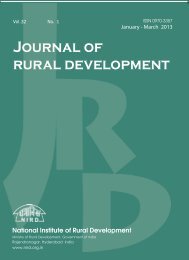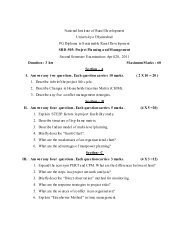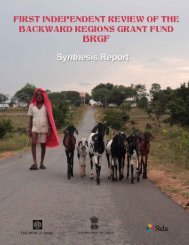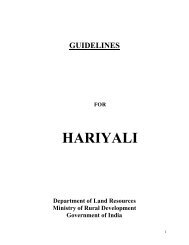Issue for October - December 2011 - National Institute of Rural ...
Issue for October - December 2011 - National Institute of Rural ...
Issue for October - December 2011 - National Institute of Rural ...
You also want an ePaper? Increase the reach of your titles
YUMPU automatically turns print PDFs into web optimized ePapers that Google loves.
458 B.B. Malik and Jaya Shrivastavaand 18 per cent DWERs accepted that gender,poor education and lower caste identity,respectively are the main reasons <strong>for</strong> notcommunicating with higher <strong>of</strong>ficials.Others Who Communicate : When theDWERs were asked ‘who communicate withthe higher <strong>of</strong>ficials on behalf <strong>of</strong> them’; morethan half <strong>of</strong> them answered that their husbandsused to communicate with higher <strong>of</strong>ficials.Some <strong>of</strong> them told about their sons/father-inlawrepresenting them. This fact indicates thedomination <strong>of</strong> male in a traditional socialstructure. A study conducted by BidyutMohanty (2002) also asserts the same result. Itis alleged that since many <strong>of</strong> the women arefirst timers and are illiterate, they depend upontheir menfolk <strong>for</strong> conducting the panchayatactivities first; the husbands <strong>for</strong> DWERs willshield them from the panchayat secretary,B.D.O if they try to harass the women. In fact,some <strong>of</strong> the state governments have passed arule that their male relatives could accompanythe women elected representative to thepanchayat. This is because in some cases, thesecretary <strong>of</strong> the panchayat tried to implicatethe inexperienced DWERs in the scams byasking them to sign on blank cheques etc.Some <strong>of</strong> the DWERs were punished because<strong>of</strong> those fraudulent acts. An interesting findingcame out from the above field experience.Even if DWERs depend on relatives, the powerrelation between husband and wife has alreadychanged due to the reservation <strong>for</strong> women,the woman’s husband gets a chance to cometo the public sphere because <strong>of</strong> the wife andparticularly no longer monolithic structure isseen in family relation.ConclusionThe conclusion derived on the basis <strong>of</strong>the empirical study is that political participation<strong>of</strong> elected dalit women in panchayat suffersfrom tripartite discrimination based on caste,gender and patriarchy. The other factors actingas a barrier are their poor socio-economicbackground and lack <strong>of</strong> education andin<strong>for</strong>mation pertaining to the system. So, itwould be concluded that the provision <strong>of</strong>reserved seats in PRI’s has merely inductedDalit women in the political process and raisedtheir status without showing any desirablesigns <strong>of</strong> their active participation in decisionmaking. It is indeed disheartening to note thatDalit women have won their seats not because<strong>of</strong> any political consciousness but because <strong>of</strong>the vested interest <strong>of</strong> either their husbands ordominant castes <strong>of</strong> the village. They work asdummy surrogate representatives. Thus <strong>for</strong> allpractical purposes their condition is similar toa puppet working at the command <strong>of</strong> itsmaster who may be male member <strong>of</strong> theirfamily or member <strong>of</strong> the dominant caste. Thestudy shows that significant number <strong>of</strong> DWERsattended meetings but few members have fullfreedom <strong>of</strong> speech and expression in thepanchayat meetings. The major reason behindthis is patriarchal set-up and thereby noncooperation.Hence, only providing reservationto Dalits <strong>for</strong> their participation in democracyis not enough. Capacity building and training,positive, cooperative and proactive attitude <strong>of</strong>the government <strong>of</strong>ficials and family membersare required. A lady panchayat secretary shouldbe appointed where elected representative isa woman. To some extent this will make thewomenfolk a bit confident; the fear <strong>of</strong> sexualityand hesitation will be minimised. As a result, itmay have a positive impact <strong>for</strong> the politicalparticipation <strong>of</strong> Dalit women.Notes1. The term ‘Dalit’ has been usedthroughout the study interchangeablywith the legal term ‘Scheduled Caste’.2. Committee on the Elimination <strong>of</strong> RacialDiscrimination/C/IND/CO/19, 5 May2007.Journal <strong>of</strong> <strong>Rural</strong> Development, Vol. 30, No. 4, <strong>October</strong> - <strong>December</strong> : <strong>2011</strong>


